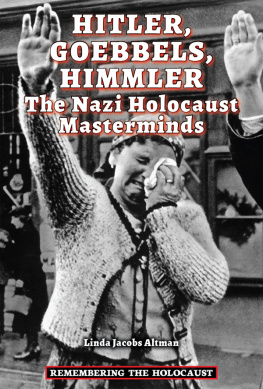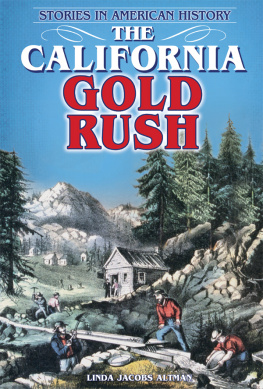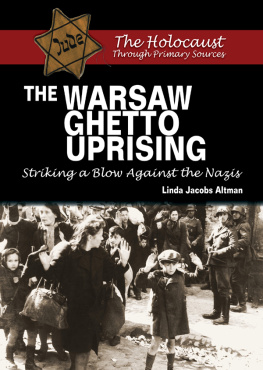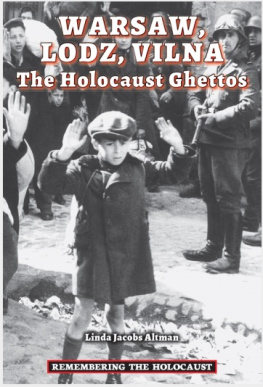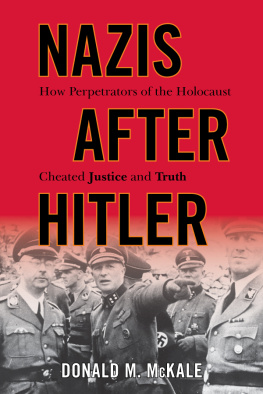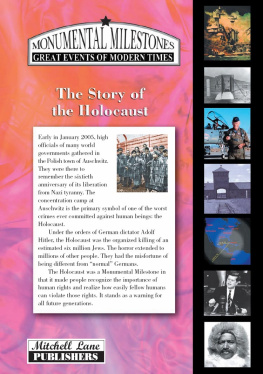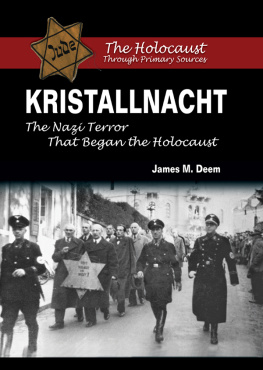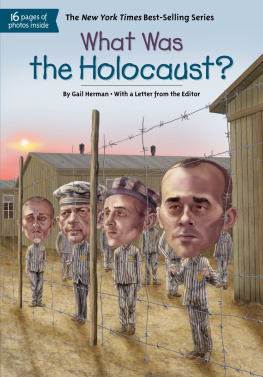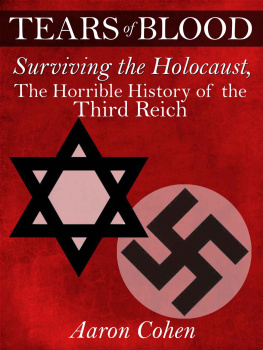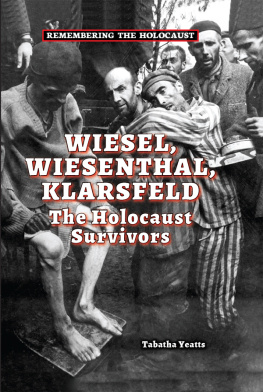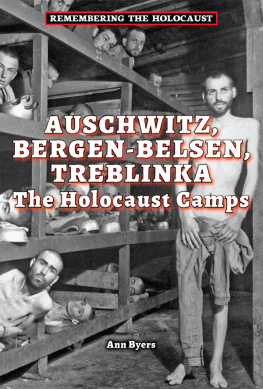The Roots of Hatred
The Holocaust was the widespread slaughter of more than 11 million peopleincluding 6 million Jewsby the Nazis.
I believe that each one of us is different and each one of us can make a difference. What happened during the Nazi era happened because people were indifferent. Perhaps, by reading this manuscript, students will not be indifferent any longer.
Henry Friedman, Chairman and President Emeritus,
Surviving Generations of the Holocaust
The roots of the hatred that led to the Holocaust began long before World War II. Author Linda Jacobs Altman describes the events and people from which the countrys worst era evolved, focusing on Hitlers rise to power and role in World War II. The atrocities that occurred during the Holocaust, Nazi Germanys most sinister episode, are thoroughly examined.
rich, fascinating, fast-paced text
Booklist
I highly recommend this book.
Church and Synagogue Library Association
ABOUT THE AUTHOR
Linda Jacobs Altman specializes in writing about history, social issues, and multicultural subjects for young people. She has also written Warsaw, Lodz, Vilna: The Holocaust Ghettos for Enslow Publishers, Inc.

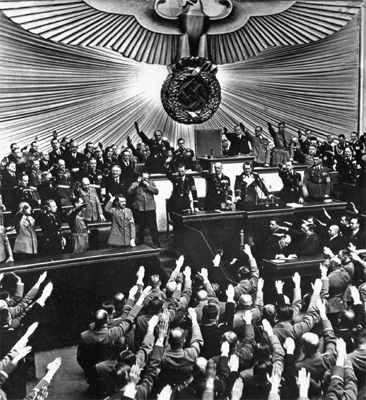
Image Credit: National Archives
Hitler annexed Austria as part of his quest for German living space." He received a standing ovation at the Reichstag after announcing his peaceful acquisition of the country.
On April 11, 1945, American troops liberated the Nazi concentration camp at Buchenwald. These soldiers had faced death many times. They had known the misery of twentieth-century warfare. None of that had prepared them for the horrors of Buchenwald: No sooner had we passed the barbed wire gate than a nauseating stench reached our nostrils. But what we saw was even worse, recalled a soldier of General George Pattons Third Army.
There were dead bodies all around the camp, some lying side by side, others piled upon each other like cordwood.... [Further on] beyond the buildings, was a deep pit. It was filled with naked bodiesmen, women and childrenin all the grotesque positions of death. Someone said that these dead were Jews.
American generals Dwight Eisenhower, Omar Bradley, and George Patton viewed the carnage. General Pattonthe fierce fighter everyone called Old Blood and Gutsstumbled away from the death pit and vomited.
General Eisenhower ordered the troops to document everything they saw. He wanted to be sure that nobody could ever dismiss it as merely... propaganda. The troops took pictures and talked to prisoners. In this way, they uncovered one horrifying truth after another.
New words came into the language and old words took on new meanings. In 1944, attorney Ralph Lemkin coined the word genocide. It meant the systematic killing of an entire racial, ethnic, political, or religious group. Holocaust originally meant mass destruction, especially by fire. After the war, it was used to describe the senseless slaughter that claimed millions of lives.
The saga of the Holocaust begins with Adolf Hitler and the National Socialist German Workers (Nazi) Party. Nazi comes from the first four letters of the German NAZIonal. By calling their regime the Third Reich, the Nazis were claiming kinship with great leaders of the German past.
The First Reich was the Holy Roman Empire. The pope laid its foundation in 800. That year, he bestowed the title of Holy Roman Emperor on Charlemagne of the Franks. The Second Reich began in 1871, when Otto von Bismarck unified the German states. It ended in 1918, with Germanys defeat in World War I.
Between the two world wars, Germany experimented with democracy. The Weimar Republic (named after the town where the constitution was written) did not last long. It faltered during the Great Depression that began in 1929. It collapsed altogether when Adolf Hitler came to power.
On January 30, 1933, Adolf Hitler became chancellor (chief minister of state) of Germany. This made him second in command under President Paul von Hindenburg. He immediately began the takeover that would lead Germany to war and genocide.
Eleven million people, 6 million of them Jews, perished during the twelve years of the Nazi Reich. Many have doubted that this grim fact could ever be explained or understood. Judaic Studies professors Calvin Goldscheider and Alan S. Zuckerman called the devastation of the Holocaust unimaginable. The scholars said that its meaning was beyond the [understanding] of humans. Its causes and effects can be studied and analyzed.
Sooner or later, anyone who studies the Holocaust must confront two questions: How could this have happened in a civilized country, and who is to blame? The search for answers has led to controversy.
Some have placed most of the blame on Adolf Hitler and the Nazi leadership. The opinions of historian Sebastian Haffner are a good example: After 1933, something like a Fhrer state [a dictatorship] would probably have come into being even without Hitler. And there probably would have been another war even without Hitler. But not the murder of millions of Jews.
The idea of no Hitler, no Holocaust (blaming the entire German people).
Most of those who study Nazi Germany believe the truth lies somewhere between the extremes. It is wrong to blame all Germans for the Holocaust. But it is also wrong to blame only Adolf Hitler and the Nazi leadership. Many factors came together at a particular time and place in history. The result was a world war, accompanied by genocide. Learning how and why these horrors came about can perhaps help us ensure that they never happen again.
In the second century B.C., the ancestors of modern Germans migrated from Northern Europe, and settled along the borders of the Roman Empire. They were not a single nation, but a group of tribes that shared a common ancestry. They called themselves Theut, meaning simply the folk or the people. The name German comes from Germani, the Roman name for one of the tribes.
After the Western Roman Empire collapsed in the fifth century A.D., the Germans pushed across the Rhine and Danube rivers. They took over Roman territories, but they had no desire to build an empire of their own. They valued personal freedom too much to live by a code of laws.
Government was almost nonexistent, and warfare was a way of life. The Roman historian Tacitus wrote that the Germanic tribes actually think it tame and stupid to acquire by the sweat of toil what they might win by their blood.
Although the Western Roman Empire was politically dead, some of its culture remained. The Germans mixed it with their own and later added Christianity to the mix. Thus, Christian, German, and Roman elements formed the foundation of German culture.
Charlemagne became king of the Franks in 768 and Holy Roman Emperor in 800. Throughout his long reign, he was almost constantly at war, extending the borders of his kingdom.
For all his power, Charlemagne could not sell the idea of an empire to the tribal Germans. They wanted leaders they could see, talk with, and touch. They cared nothing for the faceless politics of empires.
Charlemagne failed to match the grandeur of ancient Rome, but he did accomplish many things. He began to transform the hodgepodge of German law into a consistent legal code. He established a standard currency to build a good foundation for the economy. Then he turned to the Jews for help in building commerce and industry.

